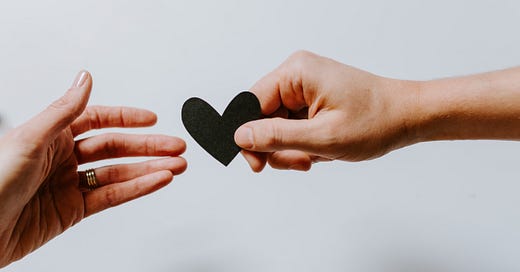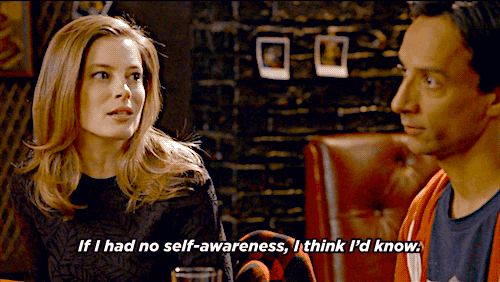The Superpower for Healthy Relationships: Unlocking Your Self-Awareness
Come with us on the road to happy, healthy and fulfilling relationships
He who masters himself masters his life.
It’s just a little bit comical, don’t you think? You can’t make this stuff up. For a world that glorifies the self and self-preservation, it seems that many of us tend to lack self-awareness and accountability.
It’s always someone or something else.
It’s never you, right?
It’s always your mom — she loves to nag. It’s always your partner — they just don’t care. It’s always your boss — they’re so ignorant.
And yet, there’s only one common denominator.
You.
Alright y’all. Before you pack up your things and leave in a huff, not to worry. I’ll be nice from here on out, I promise.
Well, I’ll try.
We’re coming up to the dreaded half-way point of the year, and as much as we can plan and make such valiant mission statements in January, stuff happens as the year progresses that can push us off kilter. Now, this isn’t a message of blame - I’m not here to blame you for the various difficulties that arise in your life. It’s far more complicated than that. However, I am here to remind and empower you with the fact that the one factor you can control, for the most part, in your life, is you.
You are your greatest asset, and you are the one experiencing things in realtime. Self awareness gives you the opportunity to not only consciously internalise that, but act upon it.
Before you choose to close the chapter on the relationship with that trifling girl or guy. Before you decide, once and for all, to break up with your friend. Before you start to give your father the cold shoulder.
Ask yourself…
…is it me?
It very well may not be you. In fact, at this point, you probably are 100% certain that you’ve been perfect in every single relationship causing you grief right now. If that’s you, I’m sure I have another article you might enjoy more.
However, if you have even the slightest thought that maybe, just maybe, you’ve lacked instances of self awareness and have contributed to strain in relationships you have…
…read on.
Summary of Key Points:
Understanding Self-awareness
Impacting Your Relationships
Exercising Your Superpower
Understanding Self-awareness
Self-awareness is a state in which the concept of the self reacts to social and environmental cues. It is a life long commitment to understanding the self, and it means taking the journey to understand your thoughts, feelings and worldview.
And guess what? You’re pretty complicated.
There are a myriad of cues and stimuli that compel your actions and reactions. It is important you learn more about yourself in order to improve your self-regulation. Many of us can often feel as though we are not in control of the situations we find ourselves in, and by extension, we feel as though we cannot control ourselves.
Being self aware allows you to trace back, and improve internal regulation. It increases your sense of ownership, and allows you to detect (and ultimately change) any negative emotions or actions which contribute to your outward disposition (what you choose to show to those around you).
Impacting Your Relationships
One of the reasons many relationships we have with other people break down, is because of poor communication facilitated by lack of self awareness.
When you haven’t spent time understanding and getting to know yourself and your values — how can you possibly expect someone else to behave and engage with you the way you want them to?
There’s so many other benefits to self awareness in relationships. Here are a few top line reasons you should prioritise self-awareness:
1. Improves capacity to empathise
Being self-aware helps you to feel more holistically about a person. Often we focus so much on ourselves, and how we are feeling in moments because we haven’t done this work outside of an altercation or interaction.
When you do this regularly, you become more aware of your thoughts and feelings in general, and start to afford people that same privilege.
Knowing how you think and feel — gives you room to step outside of yourself for a moment.
For example, actively processing and finding solutions to worries and responsibilities you have, rather than passively letting them get the best of you not only helps you decipher solutions, but helps you consider the worries and responsibilities facing those around you.
This has helped me a lot in my friendships — I manage my requests and demands on my friends for their time and support, being more cognisant of the fact that all of us are dealing with something.
2. Damage Control
Awareness of your emotional patterns and behaviour can help you nip problems in the bud before they begin. I personally hate unnecessary arguments. I also hate lack of clarity, and tend to be quite direct with my feedback to avoid my own anxious flare ups.
Once you’re aware of how you react to certain triggers and engagements, you can begin to evaluate how necessary or needed they are. Now, I’m not saying you should over-rationalise emotions, but I do think it would be good practise to deeply think about why you behave the way you do.
When your friend teases you, must you shout so loudly and sharply? Why do you get so annoyed when your boss gives you an instruction? Did you really have to be that petty when your partner accidentally left your snacks in the store?
Understanding and sticking to consistent emotional patterns will act as damage control, putting out a lot of fires before they have a chance to ruin your loved ones.
3. Create more fulfilling relationships
Self-awareness creates more fulfilling relationships. You understand more about yourself, your desires, your needs and your emotional states. You know how you desire to be loved and you can communicate that effectively. You can spend more time understanding other people by understanding yourself.
Fulfilling relationships aren’t just about comprising for other people. It’s about combining this with a sturdy and robust sense of self, alongside a commitment to improve on any areas that need pruning.
Think of how deeply fulfilling your relationships could be if everyone adhered to this.
Exercising Your Superpower: How to Be More Self-aware
Alright, so now we know about self-awareness, do we just become more…aware? Is it like a knowing, or unlocking your third eye? Do we need to meditate for 24 hours straight before we are ceremoniously knighted into the realm of…self-awareness?
It doesn’t need to be as fancy or as overtly-spiritual as that. If you’d like to meditate of course, go ahead and be my guest. For those who dwell full-time in the realm of the material, here are a couple of practical ways you can increase your sense of self-awareness.
Write about yourself.
Dear diary, today I…
I’m pulling your leg again. No, it doesn’t need to be a diary entry reminiscent of those coming-of-age American 90s blockbuster films. Although, don’t let me stop you - if that’s your thing, that’s your thing!
Writing about yourself is a great way to exercise your self-awareness muscle. Not only do you get to confront your version of events, actions, and emotions, it gives you the opportunity to reflect and process them outside of yourself. Sometimes, operating in the heat of a moment lacks true wisdom and clarity, and affect regulation (which I’ve written about here), requires you to have some level of remove from situations, trauma or environments to be effective.
Write about yourself in relation to other people. How do they make you feel? What have you communicated? What haven’t you communicated? Don’t fall into the trap of simply writing about you - write about yourself in tandem with your experiences of, and with, other people.
Ask for regular feedback
This one is tricky, and awkward at first, but necessary. How are you going to understand if you’re representing yourself in the way you want to be represented…if you don’t ask the person you’re representing yourself to? A mouthful, but you get the drift.
Assumptions kill relationships. We assume our behaviour was received well, or our actions communicated our intentions accurately. Asking for feedback allows you to identify if there is a gap between the two. When was the last time you asked your friend, if you were being a good friend to them? When was the last time you debriefed with your parents, or your siblings?
Depending on levels of comfort and closeness, leverage feedback from the people around you, to learn whether you’ve been an effective participant in these relationships.
Intentionally pursue your people.
Is it every day…romance? Sometimes, pursue your friend. Or your acquaintance. Or damn it, your sisters and brothers. We orient pursuit so much around romantic relationships, that we forget the real value there is in expressing intentional love towards our other types of relationships.
Practically, you might want to ensure you see your siblings every quarter, or perhaps regularly go out for lunch with your caregivers (as annoying as they can be). You need these relationships - positive ones can do wonders for lowering anxiety and depression, and even support with maintaining a healthy immune system.
Equally, if you are lucky in love, be intentional about that pursuit. Find novel ways to express your love to them, and never stop gathering data on what makes them smile, or what makes them happy, or what makes their day.
Self-awareness is hard, but necessary and worth it.
The quality of your relationships can sometimes largely depend on the one factor you can control — yourself.
-
That’s all from me this week folks. As ever, if you found this useful, feel free to share Optimise Me with a friend.
Let’s all become better humans.
-RK
Resources
Audio
Visual
Book






